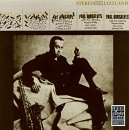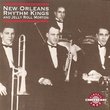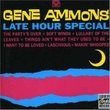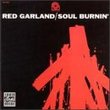| All Artists: Paul Gonsalves Title: Gettin Together Members Wishing: 2 Total Copies: 0 Label: Ojc Release Date: 7/1/1991 Genres: Jazz, Pop Styles: Swing Jazz, Bebop Number of Discs: 1 SwapaCD Credits: 1 UPCs: 025218620321, 090204021727, 090204027521 |
Search - Paul Gonsalves :: Gettin Together
 | Paul Gonsalves Gettin Together Genres: Jazz, Pop
|
Larger Image |
CD DetailsSimilar CDs
|
CD ReviewsToo cool ! Jazzcat | Genoa, Italy Italy | 08/02/2004 (5 out of 5 stars) "Coolness is never enough when your name is Paul Gonsalves. This cd is a splendid example of a real jazz record as they should always be. Fantastic musicians on very seat, an "upgraded" Wynton Kelly trio plus Nat Adderley at the cornet and Paul on tenor free to improvise on well known jazz vehicles. The music is cool, this is the perfect word to describe it. Cool mid tempo tunes with the right attitude. A relaxed extremely cool session with few really fast or slow moments which sports some spectacular solos from all the guys on well known standards and jazz progressions. A blues, a minor blues, Yesterdays, a couple of ballads, in the end a really nice program perfect for a blowing session. Paul's sound is extremely nice, you can almost hear his breath, it's extremely confidential. The year is 1960 if I remember well. What ca I add more? Long Live Fantasy OJC !!!" Ellington Alum's Classic Solo Effort Michael B. Richman | Portland, Maine USA | 07/09/2000 (5 out of 5 stars) "Paul Gonsalves was best known as a member of Duke Ellington's band. But on "Gettin' Together" he trades in his big band charts for some good old quintet jams and improvisations. Just like the Ellington band, Paul's band here is stellar as well with Nat Adderley joining on cornet, and the classic rhythm trio of Wynton Kelly, Sam Jones and Jimmy Cobb providing the backbone. The quintet delivers classic performances on a set of standards that range from "Yesterdays" to "Walkin'." Gonsalves sounds so comfortable in a small group that you'd never know he rarely performed in this context. Good thing the Jazzland label had the the good sense to record him." A star forever. Samuel Chell | Kenosha,, WI United States | 10/01/2009 (5 out of 5 stars) "I recall once being fed a line to the effect that Paul Gonsalves was unworthy of the attention of a Rollins, Coltrane, Ammons, Dexter, or Stitt. Supposedly, he was "merely" an Ellington hired hand who, moreover, had committed the unpardonable sin of going commercial with his sensational, internationally acclaimed, news-worthy solo that led to the "riot" caused by Duke's band at the 1956 Newport Jazz Festival. How ironic, and sad, that Paul's success worked to his disfavor among the jazz elite, helping explain his limited recorded production (this session along with a date shared with Sonny Stitt are the only two albums bearing his name in the title). Even the liner notes written for the 1960 date make some ridiculous statement like "you'd never guess from hearing him in Duke's band that he was such a great musician."
Those who take the time to acquire the near-miraculous digital restoration of "Ellington at Newport 1956" and to listen carefully to Paul's marathon solo/"interlude" on "Diminuendo and Crescendo in Blue" will hear an imaginative, creative mind that begs for comparisons with the Maestro himself. The performance worked because Duke knew it would--rather than "grandstanding," Paul stayed within himself, located a groove, and created just enough variety and mounting tension with each passing chorus to keep the crowd hooked. He improvised like a composer, making the most of the germ, the cell, the motif with which he began an epic adventure that unfolded magically, majestically, and memorably. There are no surprises here--merely state-of-the-art tenor playing by the musician Duke recruited to replace the legendary Ben Webster. Whether as a section player (the sound of that Ellington reed section!) or as a soloist--driving, boppish, r&b, straightahead swing, or smoldering ballads (Duke would send him out into the audience with orders to play "In a Sentimental Mood" for every woman within reach of his horn), Gonsalves was the ideal Ellington "instrument"--loyal, versatile, dependable--all except for one (very) fatal flaw--the bottle. It would end his association with the Ellington band a year before Duke's death though, unlike his employer's, Paul's passing would receive no headlines. The present session brings out the "bigness" of his sound more than the Ellington recordings, and it places him with 2/3 of the rhythm section Miles used for part of "Kind of Blue"--Wynton Kelly and Jimmy Cobb--along with a bassist, Sam Jones, who was Cannonball Adderley's first choice and, later, Oscar Peterson's (after Ray Brown had left the trio). Paul is in the pocket for all of the swingers, and he strikes deep pools of emotion on "Yesterdays," "I Surrender Dear," and "I Cover the Waterfront." A perfect program impeccably performed by a guy who could be very quiet and artistic (rather than converse with me, he preferred to sketch me), an artist who would much rather play music than talk about it. Neither this session nor the one with Stitt is likely to be around much longer. But as long as Ellington is remembered and listened to, Paul Gonsalves will be one of the most familiar, and important, tenor saxophone sounds embedded in American consciousness. His place is assured--no less than Billy Strayhorn's--thanks to his willingness to pursue a higher calling than the one presented by his own creative muse. He'd already done his duties by her--many times over." |

 Track Listings (8) - Disc #1
Track Listings (8) - Disc #1



